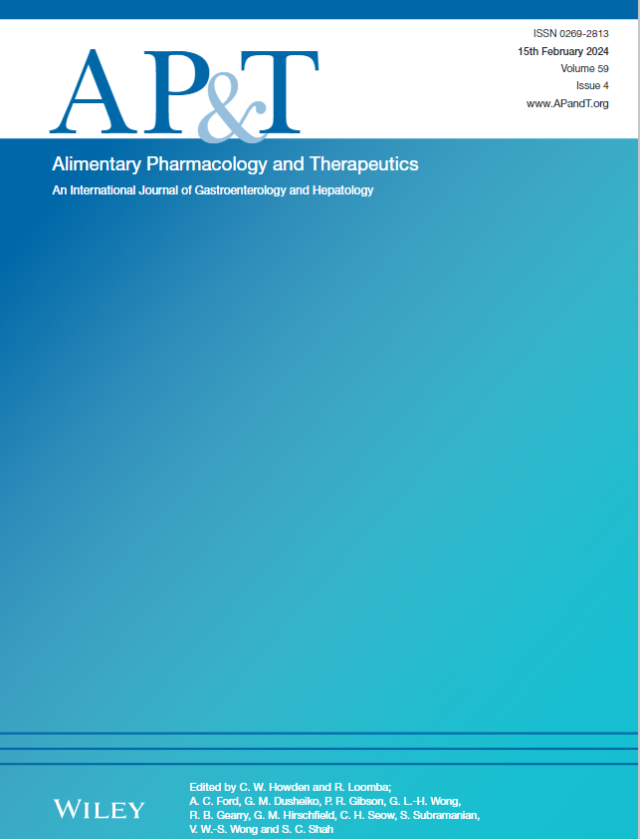Meta-Analysis: Immune-Related Adverse Events Are Associated With Improved Effectiveness of Immune Checkpoint Inhibitors in Hepatocellular Carcinoma.
IF 6.7
1区 医学
Q1 GASTROENTEROLOGY & HEPATOLOGY
引用次数: 0
Abstract
BACKGROUND While immune-related adverse events (irAEs) have been linked to improved outcomes in melanoma and non-small cell lung cancer (NSCLC), their prognostic role in hepatocellular carcinoma (HCC), a malignancy arising in a unique immune microenvironment shaped by chronic inflammation and cirrhosis, remains unexplored. This meta-analysis investigated the relationship between irAEs and the effectiveness of immune checkpoint inhibitors (ICIs) in HCC. METHODS Following PRISMA guidelines, we systematically reviewed studies from PubMed, Embase and the Cochrane Library (through December 2024) that evaluated the association between irAEs and ICIs' effectiveness in HCC. The primary outcomes were progression-free survival (PFS) and overall survival (OS), and the secondary outcomes were objective response rate (ORR) and disease control rate (DCR). Subgroup analyses assessed irAEs' types, severity and corticosteroid impact. RESULTS Among 24 retrospective studies (4798 patients), irAEs occurrence correlated with superior ORR (OR, 2.18; 95% CI, 1.64-2.89), DCR (OR, 3.09; 95% CI, 1.81-5.27), PFS (HR, 0.62; 95% CI, 0.51-0.75) and OS (HR, 0.76; 95% CI, 0.61-0.95). Dermatologic and endocrine irAEs were associated with improved survival (PFS: HR, 0.45 and 0.50; OS: HR, 0.51 and 0.59, respectively), while pulmonary, gastrointestinal and hepatobiliary irAEs did not show such relations. Low-grade irAEs (Grades 1 and 2) were linked to better survival (PFS: HR, 0.47; OS: HR, 0.48), unlike high-grade events. Corticosteroid use for irAEs management did not impair survival (PFS: HR, 0.97; OS: HR, 0.91). CONCLUSION irAEs, particularly dermatologic, endocrine and low-grade events, were associated with improved ICIs' effectiveness in HCC. Early irAEs detection and corticosteroid management preserve survival benefits. However, more large-scale prospective studies are needed to verify our findings.荟萃分析:免疫相关不良事件与肝细胞癌免疫检查点抑制剂疗效的提高有关。
虽然免疫相关不良事件(irae)与黑色素瘤和非小细胞肺癌(NSCLC)的预后改善有关,但它们在肝细胞癌(HCC)中的预后作用仍未被探索,肝细胞癌是一种由慢性炎症和肝硬化形成的独特免疫微环境中产生的恶性肿瘤。这项荟萃分析调查了肝癌中irae与免疫检查点抑制剂(ICIs)有效性之间的关系。方法:遵循PRISMA指南,我们系统地回顾了PubMed、Embase和Cochrane图书馆(截至2024年12月)的研究,这些研究评估了irae和ICIs在HCC中的有效性之间的关系。主要终点为无进展生存期(PFS)和总生存期(OS),次要终点为客观缓解率(ORR)和疾病控制率(DCR)。亚组分析评估了irae的类型、严重程度和皮质类固醇的影响。结果在24项回顾性研究(4798例患者)中,irAEs的发生与较高的ORR (OR, 2.18; 95% CI, 1.64-2.89)、DCR (OR, 3.09; 95% CI, 1.81-5.27)、PFS (HR, 0.62; 95% CI, 0.51-0.75)和OS (HR, 0.76; 95% CI, 0.61-0.95)相关。皮肤和内分泌的irAEs与生存率的提高相关(PFS: HR分别为0.45和0.50;OS: HR分别为0.51和0.59),而肺部、胃肠道和肝胆的irAEs则没有这种关系。与高级别事件不同,低级别irae(1级和2级)与更好的生存相关(PFS: HR, 0.47; OS: HR, 0.48)。使用皮质类固醇治疗irAEs并不影响生存(PFS: HR, 0.97; OS: HR, 0.91)。结论:干扰素事件,特别是皮肤、内分泌和低级别事件,与ICIs治疗HCC的疗效改善相关。早期的irae检测和皮质类固醇治疗可以保护患者的生存。然而,需要更多大规模的前瞻性研究来验证我们的发现。
本文章由计算机程序翻译,如有差异,请以英文原文为准。
求助全文
约1分钟内获得全文
求助全文
来源期刊
CiteScore
15.60
自引率
7.90%
发文量
527
审稿时长
3-6 weeks
期刊介绍:
Alimentary Pharmacology & Therapeutics is a global pharmacology journal focused on the impact of drugs on the human gastrointestinal and hepato-biliary systems. It covers a diverse range of topics, often with immediate clinical relevance to its readership.

 求助内容:
求助内容: 应助结果提醒方式:
应助结果提醒方式:


